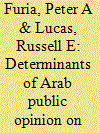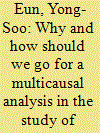|
|
|
Sort Order |
|
|
|
Items / Page
|
|
|
|
|
|
|
| Srl | Item |
| 1 |
ID:
073549


|
|
|
|
|
| Publication |
2006.
|
| Summary/Abstract |
Using Zogby International polling data from seven different Arab nations (Egypt, Jordan, Kuwait, Lebanon, Morocco, Saudi Arabia, and the United Arab Emirates) this paper offers a societal-level quantitative analysis (N=91 dyads) of the determinants of Arab public opinion toward 13 different non-Arab countries (Canada, China, France, Germany, India, Iran, Israel, Japan, Pakistan, Russia, Turkey, the United Kingdom, and the United States). We first explore whether Arab public opinion toward these countries is predicted by general "realist," "liberal," "Marxist," and/or "cultural" hypotheses suggested in the IR/foreign policy literature. After finding few statistically significant relationships among these variables, we present evidence that Arab publics evaluate non-Arab countries on the basis of those countries' specific foreign policy behaviors throughout the wider Middle East (e.g., especially those behaviors affecting Palestine and Iraq). Noting that these evaluations occur in the context of competing identity frames, we provisionally link Arab publics' concerns with "regional" matters to the high salience of "Arabist" identity among respondents to the Zogby survey.
|
|
|
|
|
|
|
|
|
|
|
|
|
|
|
|
| 2 |
ID:
117200


|
|
|
|
|
| Publication |
2012.
|
| Summary/Abstract |
This article argues that International Relations (IR) researchers concerned with why-questions about the state's external behaviour ought to employ a multicausal approach attentive to the interrelated relationship between external structures and internal agents, presenting the (meta-)theoretical rationales underlying its argument. Here the author suggests 'a rich/bold ontology' regarding foreign policy behaviour. Then the article elaborates on detailed and explicit guidelines on how to traverse the bridge that connects the insights of that rich ontology to the empirical research necessary to make claims about the real world of any one moment. In a related vein, the article claims that a multicausal approach should be established using what the author calls 'loose-knit deductive reasoning' through which epistemological and methodological openness can be preserved in a manageable way. More importantly, this article discusses the role of theory for IR scholarship and the standards for judging theoretical contributions and progress in the field of IR. Ultimately, the author argues that a complex and flexible approach - both as a useful mode of explanation and as a progressive model of theory construction - can make important contributions to a better understanding of foreign policy and world politics, not only because it enables researchers to become keenly sensitive to the complex reality underlying a nation's foreign policy and to the interrelated relationship between structures and agents in international relations, but also because it can serve to provide a secure base for the progressive accumulation of the evidence closely associated with multiple causation on which any adequate explanation about complex foreign policy behaviour must surely be founded and without which general theory cannot really flourish.
|
|
|
|
|
|
|
|
|
|
|
|
|
|
|
|
|
|
|
|
|